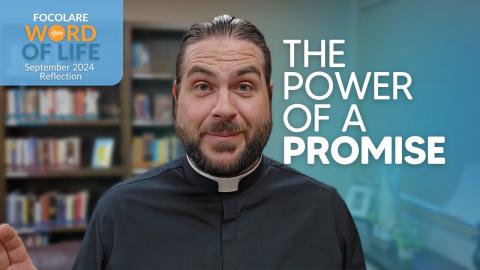“The kingdom of God is as if someone would scatter seed on the ground, and would sleep and rise night and day, and the seed would sprout and grow, he does not know how.”
(Mk 4:26-27)
The kingdom of God is at the heart of Jesus’ message. In fact, in his Gospel, Mark wants to announce this good news. He describes it in a parable Jesus used, in which he compared the kingdom of God to a seed that, once cast into the ground, releases its life force and bears fruit.
But what is the kingdom of God for us today? What does it have to do with our personal and collective history? How can it resolve the constant sense we might have of being suspended between expectations and disappointments? If it has already been sown, why don’t we see its fruits of peace, security and happiness?
“The kingdom of God is as if someone would scatter seed on the ground, and would sleep and rise night and day, and the seed would sprout and grow, he does not know how.”
This Word of Life conveys to us that Jesus had total confidence in God’s plan for humanity. Chiara Lubich wrote: “Since Jesus came into the world and was victorious over it, his kingdom is already present here on earth and its fulfilment at the end of history is already assured. The Church is the community of those who believe in his kingdom and is, in fact, its foundation.”[1]
And to all who welcome his kingdom, God entrusts the task of preparing the ground to receive this gift and to maintain hope in his love.
“(...) The fact is that no amount of human effort, no exercise in self denial, no intellectual study or research will give you the right to enter the kingdom of God. It is God himself who comes to meet you, who reveals himself with his light and who touches you with his grace. There is no merit on your part that you can boast of, or rely on, that will entitle you to such a gift from God. The kingdom is offered to you free of charge.”[2]
“The kingdom of God is as if someone would scatter seed on the ground, and would sleep and rise night and day, and the seed would sprout and grow, he does not know how.”
This parable speaks of scattering the seed. In other words, not holding on to it, but confidently sowing it over a large area. “Night and day” means that the kingdom grows silently, even in the darkness of night. And every day we can ask our Father: “Your kingdom come.”
The farmer doesn’t have to constantly check on the seed to see if it is growing. He needs to wait patiently for nature to take its course. This Word of Life helps us to understand that the seed we scatter is love and we should trust that it will bear fruit in its own time. It teaches us the art of patiently waiting for what can grow on its own, without being anxious about the result. It sets us free to welcome each neighbor in the present moment, valuing his or her potential, while respecting the time it takes them to grow.
“A month before his wedding, our son phoned us in a state of alarm because his girlfriend had started using drugs again. He asked our advice about what he should do. It wasn’t easy to know what to say. We could have taken advantage of the situation and persuaded him to leave her, but that didn't seem right. And so we suggested he listen to what his own heart was telling him (...).
“A long silence followed, then he said, ‘I think I can love her more.’ After the wedding they managed to find an excellent rehabilitation center with outpatient support. Fourteen long months passed during which she managed to keep her commitment to ‘no more drugs.’
“It will be a long road for everyone, but the evangelical love we try to have between the two of us as a couple - even though there are times when we are reduced to tears - gives us the strength to love our son in this delicate situation. Perhaps our love will also help him understand how to love his wife, too.”
Prepared by Letizia Magri and the Word of Life team
[1] Chiara Lubich, Word of Life, August 1983.
[2] Chiara Lubich, Word of Life, October 1979.





